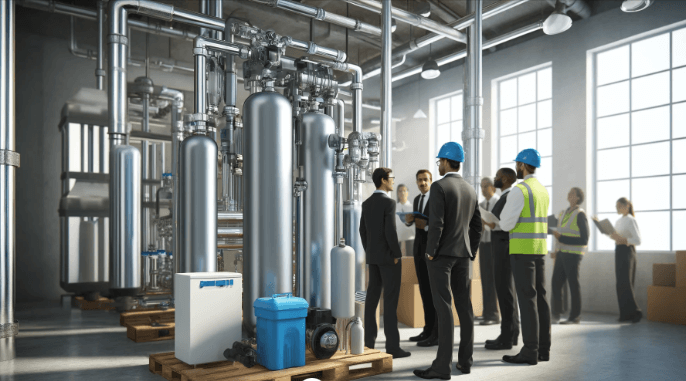
Introduction
At Robert B. Hill Co., we have observed first-hand the significant impact that hard water can have on commercial operations. It is essential for businesses to understand the benefits and return on investment (ROI) associated with installing commercial water softeners. This guide provides an expert overview of how water softeners function, their benefits, and the potential ROI, helping businesses make informed decisions.
What is a Commercial Water Softener?
A commercial water softener is a system designed to remove calcium, magnesium, and other metal cations from hard water. These systems typically use a process called ion exchange, which replaces these hard ions with softer ones, usually sodium or potassium ions. This process not only softens the water but also extends the lifespan of plumbing and appliances by preventing scale buildup.
Benefits of Commercial Water Softeners
Extended Appliance Life
One of the most significant benefits of using a water softener in a commercial setting is the extended life of appliances and plumbing systems. Hard water can cause a buildup of minerals inside pipes and machinery, which can lead to inefficiencies, increased energy usage, and eventual breakdowns. Soft water, on the other hand, minimizes this risk, ensuring that appliances run more efficiently for longer.
Reduced Soap and Detergent Usage
Soft water requires less soap and detergent for cleaning tasks because it does not contain minerals that interact with cleaning agents. This results in a reduction in the amount of soap needed, which can lead to significant cost savings over time.
Enhanced Efficiency
Water heaters and boilers operate more efficiently with soft water. Since there is no scale buildup, these units can transfer heat more effectively, reducing the energy needed to heat water. This increased efficiency can lead to substantial energy savings, especially in large commercial facilities.
Improved Product Quality
For businesses that use water in their production processes, such as in the food and beverage industry, soft water can enhance the quality of the products made. Hard water can affect the taste, appearance, and texture of food products. Soft water ensures that the intended quality and consistency of products are maintained.
Calculating the ROI of Commercial Water Softeners
Cost Analysis
To understand the ROI of installing a commercial water softener, businesses must consider the initial installation costs versus the ongoing savings. The key areas where savings occur include:
- Reduced repair and maintenance costs for appliances and plumbing.
- Lower energy bills due to increased efficiency of water heaters and boilers.
- Decreased expenditures on detergents and soaps.
Typically, the break-even point for a commercial water softener system can be achieved within a few years, depending on the water usage rates and the hardness of the water in the area. After surpassing the break-even point, the savings directly contribute to the profitability of the business.
Conclusion
Investing in a commercial water softener is not just a cost but a strategic investment that can enhance operational efficiency, extend the lifespan of commercial equipment, and improve product quality. The ROI from installing such a system can be substantial, offering not only financial benefits but also contributing to environmental sustainability by reducing chemical usage and energy consumption. At Robert B. Hill Co., we are dedicated to providing solutions that meet the specific needs of our clients, ensuring optimal performance and satisfaction.
